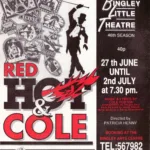Season 46 Play 8 – Red Hot & Cole by Dougee Zeno. Music & Lyrics by Cole Porter
Directed by
Cast
Actor 1 Cole Porter – Malcolm Pinder
Actress 2 Irene Castle, Dancer – Hayley Richards
Actor 2 Paul (Cole’s valet) – Bruce Sturrock
Actress 3 Sara Murphy,Hedda Hopper, Dorothy Parker, Bella Spewack – Louise Hindle-Barton
Actor 3 Clifton Webb, English Soldier, Sam Katz, George Kaufman, Noel Coward – David Scottow
Actress 4 Linda Porter – Wendy Coombs
Actor 4 Photographer, Dancer – Andrew Bailey
Actress 5 Bricktop, Dancer – Fiona Erlington
Actor 5 Moss Hart, Dancer – John Foster
Actress 6 Starlet, Dancer – Rachel Leskovac
Actor 6 Monty Woolley, Ray Goetz – Vincent Dore
Synopsis
The lifestyle of Cole Porter, through his own glorious music, enhanced by glamorous costumes in imaginative settings and staged with all the verve, style and panache which typifies Bingley Little Theatre’ ‘send-of-season musical,
Directors Notes
RED HOT AND COLE
Cole Porter: a man possessed of an outrageous sense of humour, a voracious, if not conventional appetite for life and an enormous talent for words, music and friendship. He was born in Peru Indiana, attended Yale and was destined to study Law. His devoted mother Kate encouraged his musical ability, against the wishes of his wealthy autocratic grandfather. He went to France in July of 1917 with a specially made zither like a portable piano strapped to his back, not as a member of the American armed forces but as a volunteer for the Duryea Relief mission; the rumours of his joining the French Foreign Legion and being awarded the Croix de Guerre were circulated by Cole himself. Cole and France got along famously and it was here that he met and married Linda Lee Thomas, a wealthy divorcee eight years older than himself, whose devotion to Cole and his interests was absolute. They travelled extensively with a host of friends, one of whom, Elsa Maxwell an upper echelon social director with formidable social contacts but no money, played a large part in Cole’s early artistic and social development. His name became synonymous with the sophisticated spirit of the 1920s and 30s. Cole once told an interviewer, “I must play to work and I must work to play. It’s all bound together.” The Cole Porters returned to America and made it their main base alternating between Broadway and Hollywood. Hollywood perfectly suited Cole’s personality and the studios system ensured that his sexual tastes, which ran to men rather than women, were amply provided for. It was this devotion to pleasure that caused his estrangement from Linda, who whilst she was perfectly aware of her husband’s preferences, did not appreciate the openness with which he took to this side of Hollywood life. They were still estranged when in October 1937 Cole had a riding accident which shattered both his legs. Linda returned to his side and remained there for the rest of her life; the inscription on her headstone, on her own instructions, reads only “Linda Lee Porter, wife of Cole Porter”. Cole spent the rest of his life in great physical pain, either in a wheelchair or on walking sticks, but it was only when he finally had to have his leg amputated that he gave up writing music, and lost the will to live. He died on 15th October 1964. He had written 700 songs, most of which boasted words and music by Cole Porter. Linda Ronstadt has said that only Cole Porter songs have that magical ability to marry words and music so that one is part of, and is extended by the other. If you consider for a moment the lyrics of “Let’s Do It” , written in 1928, “Love for Sale” written for “The New Yorkers” in 1929 and banned from the radio; these lyrics are sixty five years old. Songs such as “I Get a Kick Out of You” (1931) , “Anything Goes” (1934), “Don’t Fence me In’ ” (1934); “Begin the Beguine “Just One of Those Things ” (1935) “I’ve Got You Under My Skin” “It’s Delovely” (1936) “In the Still of the Night” (1937) “My heart Belongs To Daddy” (1938) “Friendship” (1939) all of these songs are over fifty years old and are still being sung today, The great musicals “Kiss me Kate” (1948), * “Can Can” (1953), “Silk Stockings”
(1956) and “High Society” (1956) were written towards the end of his life and show no reduction of musical talent or wit.
In order that anyone amateur, or professional may do justice to the life of such a brilliant talent, other excellent talents must be gathered together to form the production team. I have been fortunate that in my team, cast and crew, the talent has been abundant. I cannot thank the backstage department, set design, wardrobe team, lighting design and backstage crew enough for allowing my imagination to have full play and doing their utmost to ensure that what I saw inside my head was translated on to the stage. I also salute my most talented cast which marries experience with youthful energy, raw talent with smooth technique and a wonderful collective sense of humour with innate good manners. I am sure the cast would want to join me in thanking our musical director and resident pianist, who I can guarantee you as an audience will love, together with our rehearsal pianists, who have tried their best to ensure that Mr Porter’s music is given the respect to which it is entitled.
I came to this musical not knowing anything about Cole Porter, the man; his life, both glamorous and sordid, privileged and tragic, has for me added a further dimension to his work; it may do the same for you, but even if it does not this show, however well, or not so well we do it, is a great night at the theatre and it has been a privilege to work on it.


